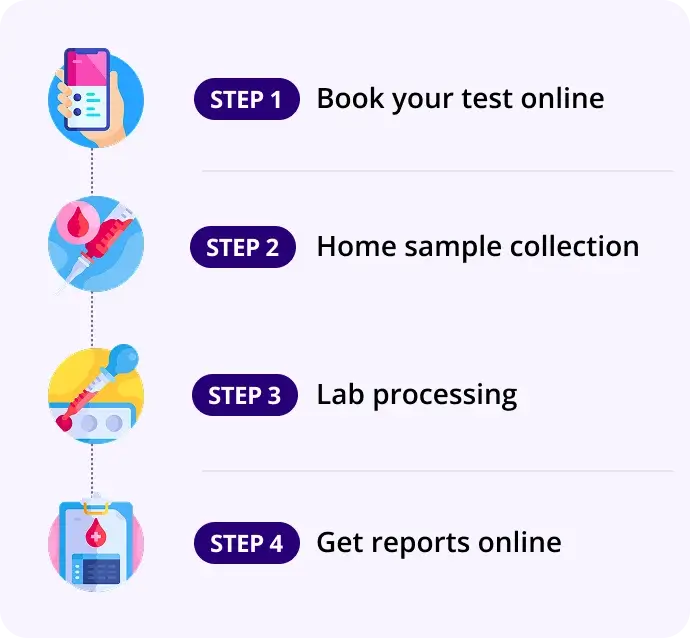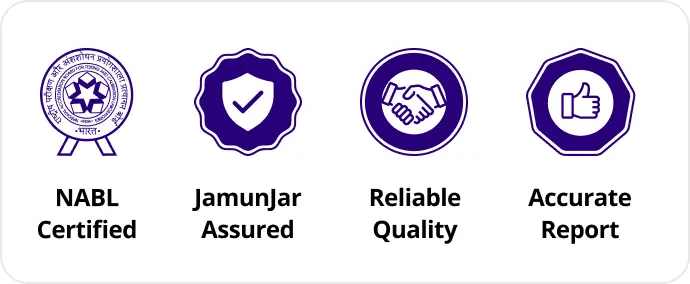Search for
Prostate Specific Antigen (PSA) - Total
Cancer
Report in 4Hrs
At Home
No Fasting Required
Details
Prostate-Specific Antigen test screens for prostate cancer and monitors treatment response.
₹149₹770
81% OFF
FREE:
Ai Insights
Prostate Specific Antigen (PSA)-Total Test Guide
- Why is it done?
- Test Purpose: Measures the total level of prostate-specific antigen (PSA) in the blood, a protein produced by the prostate gland to assess prostate health and detect abnormalities.
- Prostate Cancer Screening: Primary screening tool for prostate cancer in asymptomatic men, typically recommended for men aged 40-50 and older.
- Symptom Investigation: Ordered when men present with urinary symptoms such as difficulty urinating, frequent urination, or blood in urine.
- Benign Prostatic Hyperplasia (BPH) Evaluation: Used to differentiate between benign enlargement and malignant changes in the prostate.
- Prostatitis Monitoring: Helpful in assessing prostate inflammation or infection-related complications.
- Treatment Monitoring: Serial PSA testing used to monitor effectiveness of prostate cancer treatment or early detection of recurrence.
- Timing: Typically performed during routine health screening, when symptoms arise, or based on physician recommendation based on risk factors and family history.
- Normal Range
- Standard Reference Range: 0 to 4.0 ng/mL (nanograms per milliliter) - considered normal for most men.
- Age-Adjusted Ranges: Some laboratories use age-specific reference ranges: • Age 40-49: 0 to 2.5 ng/mL • Age 50-59: 0 to 3.5 ng/mL • Age 60-69: 0 to 4.5 ng/mL • Age 70+: 0 to 6.5 ng/mL
- Units of Measurement: ng/mL (nanograms per milliliter) or µg/L (micrograms per liter).
- Interpretation Categories: • Normal/Negative: Less than 4.0 ng/mL - typically indicates low risk for prostate cancer • Borderline/Gray Zone: 4.0 to 10.0 ng/mL - warrants further evaluation and monitoring • Elevated: Greater than 10.0 ng/mL - significant concern for prostate pathology, immediate urologic evaluation recommended
- What Normal Means: PSA level within normal range suggests minimal prostate disease burden, though it does not completely exclude prostate cancer.
- What Abnormal Means: Elevated PSA may indicate prostate cancer, benign prostatic hyperplasia, prostatitis, or recent urologic procedures; however, elevated PSA alone is not diagnostic.
- Interpretation
- PSA <2.0 ng/mL: Very low risk for prostate cancer; routine screening at standard intervals recommended.
- PSA 2.0-4.0 ng/mL: Normal range; low cancer risk, but continued monitoring recommended based on age and risk factors.
- PSA 4.0-10.0 ng/mL: Borderline/elevated range; approximately 25% risk of prostate cancer; further evaluation with PSA velocity, free PSA percentage, or DRE recommended.
- PSA >10.0 ng/mL: Significantly elevated; approximately 50% risk of prostate cancer; urologic consultation and possible biopsy recommended.
- Rapid PSA Velocity: Increase >0.75 ng/mL per year warrants close monitoring and possible further investigation regardless of absolute value.
- Factors Affecting PSA Levels: • Recent ejaculation (can elevate PSA for 24-48 hours) • Digital rectal examination (can elevate for 24-48 hours) • Prostate biopsy (can elevate for 4-6 weeks) • Urinary tract infection or recent cystoscopy • Vigorous exercise, particularly cycling • Recent urologic procedures • Certain medications (5-alpha reductase inhibitors can lower PSA) • Prostate size and age of patient
- Clinical Significance: Serial PSA testing is more informative than a single result; trending over time provides better cancer risk stratification than isolated measurements.
- Specificity Considerations: Total PSA alone has limited specificity; free PSA percentage and PSA density may improve diagnostic accuracy in borderline cases.
- Associated Organs
- Primary Organ: Prostate gland - a walnut-sized gland that produces PSA, a component of seminal fluid with proteolytic properties.
- Related Systems: Male reproductive system, urinary system, and endocrine system (influenced by androgens).
- Prostate Cancer: Most common malignancy associated with elevated PSA; PSA test is primary screening tool for early detection; elevated PSA may indicate need for biopsy and imaging studies.
- Benign Prostatic Hyperplasia (BPH): Age-related prostate enlargement causing urinary symptoms; can elevate PSA independent of cancer presence.
- Prostatitis: Acute or chronic prostate inflammation/infection causing elevated PSA, urinary dysuria, and pelvic pain.
- Urinary Tract Involvement: PSA elevation can impact urinary flow and retention; prostate pathology may cause urinary frequency, nocturia, and hesitancy.
- Potential Complications: • Urinary retention and overflow incontinence • Urinary tract infections • Hematuria (blood in urine) • Erectile dysfunction • Metastatic cancer spread to bones and lymph nodes • Acute urinary obstruction requiring catheterization
- Systemic Implications: Advanced prostate cancer with elevated PSA can metastasize systemically affecting bone health, lymphatic system, and overall patient survival.
- Follow-up Tests
- Free PSA Percentage: Recommended when total PSA is 4.0-10.0 ng/mL; free PSA <25% suggests higher cancer risk; helps differentiate cancer from benign disease.
- Digital Rectal Examination (DRE): Physical examination of prostate; recommended when PSA is elevated to assess prostate texture, size, and detect nodules.
- Transrectal Ultrasound (TRUS): Imaging study to visualize prostate structure; often performed prior to biopsy or to measure prostate volume for PSA density calculation.
- Prostate Biopsy: Tissue sampling for histopathologic examination; recommended when PSA significantly elevated or concerning DRE/imaging findings present.
- PSA Density: PSA level divided by prostate volume; higher density suggests greater cancer risk; calculated after TRUS volume measurement.
- PSA Velocity: Rate of PSA change over time; rapid increase (>0.75 ng/mL/year) warrants further investigation independent of absolute value.
- 4Kscore and PHI Testing: Advanced biomarker tests combining PSA measurements and other markers to improve cancer risk prediction in borderline PSA ranges.
- MRI Fusion Imaging: Advanced imaging combining MRI with ultrasound to guide targeted biopsies in suspicious areas.
- Bone Scan and CT Imaging: Staging studies recommended when cancer diagnosed to assess metastatic spread.
- Urinalysis and Urine Culture: Recommended to rule out urinary tract infection as cause of elevated PSA.
- Repeat PSA Testing: Screening intervals: every 1-2 years if normal; annual if borderline; 3-6 months if cancer diagnosed and treated for early recurrence detection.
- Fasting Required?
- Fasting: NO - Fasting is not required for PSA testing. This is a simple blood draw that can be performed any time of day with or without food.
- Pre-Test Precautions: Avoid sexual activity or ejaculation for 24-48 hours before test; these can temporarily elevate PSA levels.
- Avoid Digital Rectal Examination: If possible, avoid DRE or urologic procedures for 24-48 hours before PSA test to prevent artificially elevated results.
- Cycling and Vigorous Exercise: Avoid prolonged cycling and strenuous exercise 24 hours before test; these can cause minor PSA elevation.
- Medications to Avoid: • 5-alpha reductase inhibitors (Finasteride, Dutasteride) - these medications lower PSA levels by approximately 50%; inform provider if taking • Testosterone replacement therapy - can elevate PSA • Antibiotics for urinary tract infections - wait until infection resolved before testing
- Recent Procedures: • Wait 4-6 weeks after prostate biopsy before repeat PSA testing • Wait 48 hours after cystoscopy or catheterization • Wait 48 hours after urinary tract manipulation
- Hydration: Normal hydration is acceptable; no specific fluid restrictions required.
- General Preparation: Come dressed in loose, comfortable clothing for easy blood draw access; inform phlebotomist of any recent urologic procedures or infections.
How our test process works!

